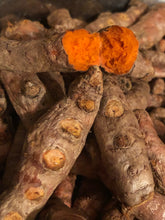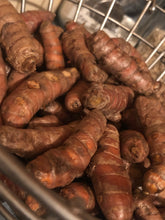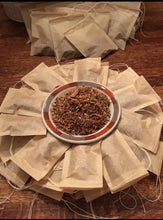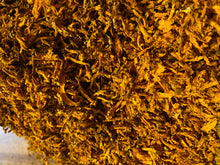Turmeric Tea (dried & grated)
Regular price
$15.00
Sale
Turmeric is an amazing healer. It’s also amazingly hard to find fresh or in any form NOT powdered. Our dried turmeric is grated and dried FRESH. Large, identifiable pieces that taste fresh! There is a huge difference in flavor when you make a tea or cook with turmeric that is fresh. This is the same turmeric we use in our Fire Tea & Elixir. We also have fresh rhizomes available most of the year.
Turmeric tea, brewed using grated turmeric root or pure powder, is considered one of the most effective ways to consume the spice.
There is no specific recommended daily intake of turmeric. Based on available research, the suggested daily intake depends largely on the condition it is being used to treat.
Most research in adults supports the safe use of 400 to 600 milligrams (mg) of pure turmeric powder three times daily, or 1 to 3 grams (g) daily of grated or dried turmeric root. Grating the turmeric yourself is the best way to ensure a pure product.
Did you know?
It takes 1 full pound of fresh turmeric to make just one half ounce of dried turmeric tea! Wow! 1 pound fresh = 1/2 oz dried
Drinking turmeric tea is believed to bring about several benefits, nine of which are described in more detail here.
1. Reduces arthritis symptoms
As an anti-inflammatory, curcumin may help reduce the most prominent symptoms of arthritis.
A 2017 study found that out of 206 American adults with self-reported rheumatoid arthritis, 63 percent used non-vitamin supplements to manage their symptoms, with turmeric being the most popular product that was taken.
2. Boosts immune function
Curcumin is proven to improve immune function with antioxidant, anti-inflammatory, antiviral, and antibacterial properties.
Curcumin has also been shown to act as an immune modulator, helping regulate immune cell function against cancer.
3. Helps reduce cardiovascular complications
Several studies have shown curcumin to have beneficial heart health properties by acting as an antioxidant and anti-inflammatory.
A 2012 study found that taking 4 g per day of curcumin 3 days before and 5 days after coronary artery bypass grafting surgery, reduced the risk of acute myocardial infarction or heart attack by 17%
4. Helps prevent and treat cancer
One of the most clinically established therapeutic properties of curcumin is its anti-cancer action.
As an antioxidant and anti-inflammatory, curcumin is thought to lower the risk of cells in the body becoming damaged, reducing the risk of cell mutations and cancer.
Furthermore, numerous studies have shown that curcumin has anti-tumor properties, limiting the growth of tumors and spread of cancerous cells.
According to a 2014 medical review, more than 2,000 articles have been published using the keywords "curcumin" and "cancer." The use of curcumin as a cancer treatment alongside chemotherapy and radiation therapy is currently being investigated.
5. Helps manage irritable bowel syndrome or IBS
Curcumin has long been used in traditional medicines as a treatment for many digestive conditions.
Several studies have found that curcumin may help reduce the pain associated with IBS and improve the quality of life of those people with the condition.
A 2012 study in rats found that curcumin helped decrease the time it took for food to empty from the stomach to the small intestine, otherwise known as gastric emptying.
6. Prevents and treats Alzheimer's
Studies have shown that curcumin may help reduce the chances of several neurodegenerative conditions. Its antioxidant and anti-inflammatory powers are thought to reduce cellular damage, inflammation, and amyloid deposits or plaques that occur with these conditions.
Curcumin may also be able to slow down or prevent some of the age-associated protein changes linked to neurodegeneration.
7. Protects against liver damage, gallstones, and manages liver conditions
Several studies have shown that curcumin can protect against liver damage. Potential liver and gallbladder benefits of curcumin include increasing production of the digestive fluid bile while also protecting liver cells from damage from bile-associated chemicals.
8. Helps prevent and manage diabetes
Traditional medicines have used turmeric for diabetes for thousands of years. Several studies using animal and human models have shown that curcumin supplementation may have anti-diabetes properties.
9. Helps treat and manage lung conditions
Researchers suspect that the anti-inflammatory and antioxidant properties of curcumin may help reduce the symptoms of chronic or long-lasting lung conditions.
A 2017 medical study concluded that although the clinical evidence is limited, curcumin might help treat asthma, pulmonary and cystic fibrosis, lung cancer or injury, and chronic obstructive pulmonary disease (COPD).
NOTE: Curcumin, the active component in turmeric, has low bioavailability, which means the body has a hard time accessing and absorbing the compound. For this reason we suggest always consuming your turmeric with black pepper, which has compounds that make curcumin easier for your body to absorb.










